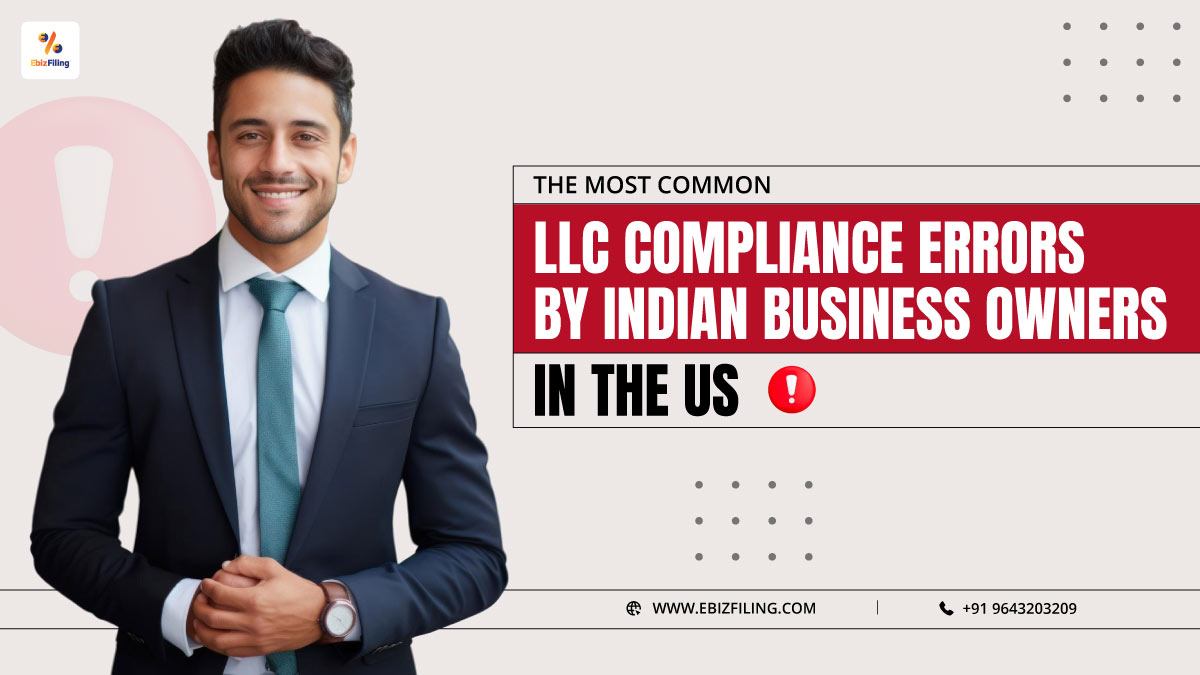
-
July 11, 2025
-
ByDhruvi D
LLC Annual Compliance: Mistakes Indian Entrepreneurs Commonly Make in the US
Introduction
Starting an LLC and registering it with the state is not sufficient to keep your business safe and active. LLCs have specific annual compliance requirements that help them maintain their legal status. First, you need to file an annual report, which updates your business information. You also have to pay any state fees or franchise taxes even if your business did not make any money that year. It also includes special permits or licenses for your business, to keep an operating agreement up to date, and to ensure your registered agent’s information is correct. Doing these things every year helps your LLC stay legal and focuses on growing your business.
What is an LLC Annual Compliance?
An LLC helps your business look official and protects your personal assets, but to keep these benefits, you must follow your state’s rules every year. Most states require you to file an annual or biennial report with updated business information, such as members and addresses. Keeping your information ready is essential, or else you will face fines or even be closed.
Mistakes Indian Entrepreneurs Commonly Make in the US while LLC
1. Missing Annual Report Deadlines: Every state requires LLCs to file annual or biennial reports to keep their information up to date. If you forget to file, you could face late fees or your LLC might be closed by the state. Always track your deadlines using reminders or registered agent service.
2. Not Paying State Franchise Tax or Fees: States like California, Delaware, and Texas charge early franchise taxes even if your LLC is not making money. If you skip these payments, you could get penalties or your business could be suspended. Always check with a US accountant to stay compliant.
3. Not Having a Registered Agent: If you use a friend or family member and they miss important mail, you could miss lawsuits or official notices. This can lead to fines or loss of good standing. It is safer to use a professional registered agent service.
4. Mixing Personal and Business Money: Using your personal bank account for business transactions can remove your liability protection. Always open a separate US business bank account and keep clear records.
5. Skipping IRS Forms for Foreign Owned LLCs: If your LLC is foreign-owned, you must file IRS form 5472 along with a pro forma Form 1120 each year, even if you have no income. It is best to work with CPA who understands international rules.
6. Delaying EIN or ITIN Application: You need your Employer Identification Number to open a bank account or file taxes. Sometimes, you also need an Individual Taxpayer Identification Number. Delays can prevent you from opening a U.S. bank account or filing taxes on time. Apply for these numbers as soon as possible.
7. Ignoring Local Business License: Registering your LLC with the state is not enough. Many cities and countries need separate business licenses or permits. Always check local rules. Cities like New York, Los Angeles, and Chicago have separate business license requirements.
8. Not Updating Company Records: You must keep your LLC’s documents, like operating agreements and ownership records, up to date. Poor records can cause problems during audits, legal disputes, or when raising money.
9. Thinking LLCs Don’t Pay Taxes: LLCs are not tax-exempt. Even if you have no income, you may still need to file tax returns. Not understanding your LLC’s tax rules can lead to under-reporting or penalties.
10. Forgetting to Register in Other States: If your LLC does business in more than one state, you need to register in each state. Skipping this can lead to fines and make it hard to enforce contracts. Check where your LLC needs to be registered and get legal advice if needed.
Conclusion
To keep your LLC safe, you must follow these steps, like filing reports, paying taxes, and keeping records updated. Many Indian entrepreneurs miss these steps by mistake. These small errors can lead to big problems like fines or even business closure. So stay organised or take help from professional experts who help to protect your business.
Suggested Read :
Legal Mistakes by Indians in US LLC Formation
US LLC Audit & Accounting Rules for Indian Owners
How Indians Avoid Double Taxation on US Income?
Cross-Border Compliance for Indian Entrepreneurs
US Bank Account Compliance for Indian-Owned LLCs
Frequently Asked Questions on US LLC Compliance for Indian Founders
1. What happens if I miss my US LLC’s annual compliance deadline?
If you miss the deadline to file your annual report or pay franchise taxes, your LLC may:
- Incur late fees or penalties
- Lose its good standing status
- Eventually face administrative dissolution by the state
- Each state has its own grace period, so consult your registered agent or compliance partner immediately.
2. Do I still need to file tax documents even if my LLC made no income?
Yes. For foreign-owned single-member LLCs, the IRS mandates filing:
- Form 5472
- A pro forma Form 1120
- This is required even if your LLC earned zero revenue. Skipping this can lead to a $25,000 IRS penalty.
3. Can I use my personal bank account for LLC transactions?
No. Mixing personal and business funds is a common compliance mistake.
Doing so risks:
- Losing your limited liability protection
- Making audits and tax filings complex
- Open a dedicated U.S. business bank account to maintain separation.
4. What if I don’t appoint a professional registered agent?
If you use a friend or relative who misses an official notice, your LLC could:
- Miss lawsuits or state communications
- Be penalized or suspended
- A professional registered agent service ensures reliable handling of time-sensitive legal documents.
5. I formed my LLC in one state—do I need to register in other states too?
Yes, if you do business in another state, you must register as a foreign LLC there.
This includes:
- Having a physical presence
- Hiring employees
- Holding inventory
- Not registering can result in fines or unenforceable contracts in those states.
6. Do Indian entrepreneurs need to be physically present in the U.S. to run an LLC?
No. You can form and manage a U.S. LLC 100% remotely.
You’ll need:
- A registered U.S. address
- An EIN (Employer Identification Number)
- Possibly an ITIN (Individual Taxpayer Identification Number) for personal filings
7. What is the cost of forming and maintaining an LLC in the U.S.?
Costs vary by state. For Indian founders, common expenses include:
- Formation fee: $50–$200 (one-time)
- Annual/biennial report: $20–$500 depending on the state
- Franchise tax: E.g., $800/year in California
- Registered agent fee: $100–$150/year
8. Which states are best for LLCs for Indian or foreign owners?
Top states for foreign-owned LLCs are:
- Wyoming: No state tax, strong privacy
- Delaware: Preferred for startups, legal protections
- Nevada: No franchise tax, business-friendly laws
These states are often chosen to minimize costs and paperwork.
9. Do I need a local business license if I already registered my LLC?
Yes. State registration does not exempt you from local or county business license requirements.
Examples:
- Los Angeles and New York City require additional registrations
- Missing them can result in local fines or inability to operate legally
10. How can I avoid compliance mistakes as an Indian founder running a US LLC?
Avoid common errors by:
- Using compliance software or hiring a professional
- Tracking filing deadlines and taxes
- Ensuring accurate recordkeeping and document updates
Company Registration in USA
Start Your US Business Today! EbizFiling helps you Register your Company within minutes.
About Ebizfiling -










February 20, 2026 By Steffy A
Why Ignoring Compliance Can Harm Business Reputation? Introduction Ignoring compliance harms business reputation because it breaks trust with customers, investors, and stakeholders. When a company fails to follow regulations, it signals poor responsibility and weak governance. This can lead […]
February 19, 2026 By Steffy A
Why Automation Is Becoming Essential for Business Compliance Introduction Companies today must follow multiple regulations, maintain proper records, and respond quickly to audits or legal updates. Traditional manual methods are no longer enough to manage growing compliance demands. Automation […]
February 18, 2026 By Steffy A
Consulting Firms vs Compliance Platforms: Which to Choose in 2026? Introduction At Ebizfiling, we often hear this question from clients: “Why hire a consulting firm when compliance platforms are cheaper?” While compliance platforms are more affordable, they often […]